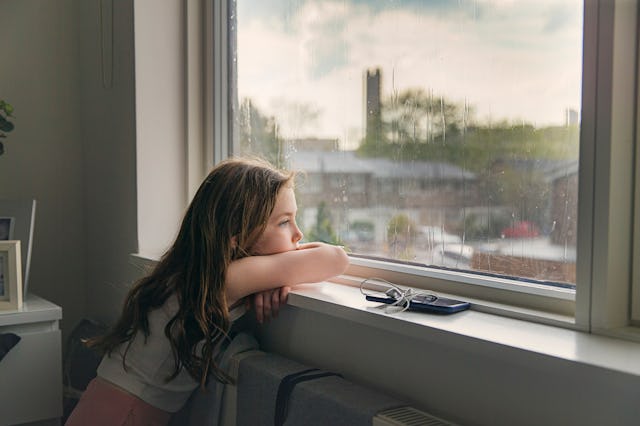12 Signs Of Bullying That Could Be Red Flags Your Kid Is A Target
Bullying signs can show up in unexpected ways, explains expert Laurie Singer.

Each school year brings a new set of challenges for children. While challenges like learning new skills and subjects are often positive, fitting in and making new friends can be stressful — especially if bullying is part of the equation. When kids experience bullying, they might not even recognize what is actually happening and therefore have difficulty asking an adult for help, leaving them to cope on their own. And the ways in which children cope with bullying aren't always obvious to them — or to adults. In fact, outward signs can show up in unexpected ways.
That's why it's important to be aware of these red flags that your kid is being bullied and how you can help them cope. For expert insight, Scary Mommy tapped family therapist and behavior analyst Laurie Singer.
What is bullying, and where does it happen?
By definition, bullying is behavior towards another person that is intended to hurt them physically and/or emotionally. This means that bullying doesn't just occur in academic settings.
"While school is an obvious setting where bullying can and does take place, bullies are opportunistic, which means it can happen in a variety of settings. A park, a friend's house, a practice or club activity, just walking down the street, or even at home are just some of the situations where a child may encounter bullying. And, of course, cyberbullying is becoming a much more common occurrence," says Laurie Singer MS, LMFT, BCBA.
How do I know if my kid is being bullied?
As mentioned, the signs of bullying aren't always easy to spot. They can be physical or manifest in behavioral ways that could easily be misinterpreted as "bad" behavior, such as an unwillingness to cooperate in daily routines. For example, a child may complain about going to school, delaying the process by refusing to eat breakfast or to get cleaned up and dressed for the day. They might even say they have a headache or stomach ache, which is often a real physical effect of emotional stress.
"It's not uncommon for children who are the victims of bullying to begin showing signs of anxiety," said Singer, adding, "It's important that parents pay attention to any change in their child's behavior [and open up the conversation]. Let them know you love them and that you are there to help keep them safe. Ask questions like 'How is school going? Who do you play with? Tell me what you do at school.' And other situations that may provide some clues."
Emotional Signs of Bullying
- Withdrawing from family and friends
- Being quieter or more outspoken than usual
- An anxious and nervous demeanor
- Outbursts of anger
- Poor academic performance
- Decreased interest in hobbies
Physical Signs of Bullying
- Increased illness, including stomachaches and headaches
- Changes in eating habits (eating more or less than usual)
- Bruises, cuts, and other marks on the body
- Inability to control bladder or bowel movements
- Disrupted sleep routine
- Lost or damaged items (clothing, money, and other personal items)
How can I help my child cope if they are being bullied?
"Teaching children the appropriate responses to bullying is the key to helping them. As a parent, it's our responsibility to teach our children the social skills they need to both identify when they're being bullied and the right steps to take," says Singer, suggesting that, once parents have identified that their children are being bullied, they take the opportunity to role-play. "Have your child act out the role of the bully. This will help you get a better understanding of how your child is being treated, and you can better demonstrate the appropriate verbal response. Then change roles. You will be the bully, and your child will practice their newly learned skills of responding to the bully," she explained.
In many cases, bullying can be quickly resolved with the full participation of those involved. If the setting is school, administration and teachers should be involved. In a setting that is harder to control or in the case of a prolonged situation, counseling with a qualified child therapist may be necessary for helping a child cope. And don't underestimate the power of the support of family and friends, as well as participation in physical activities and hobbies that reduce stress and bring joy — yoga, drawing, or just a family game night can be immensely helpful.
What if my kid is the bully?
It's difficult to accept when our own children are the cause of a problem. But it won't do them any favors to ignore the fact. Singer says parents should be aware that bullying involves both the bully and the bullied and that it's critical to help children develop healthy social skills and boundaries. "Bullies typically lack the social skills needed to get along with their peers. Parents can talk with the school and let them know they want to work together in helping the child," added Singer, stressing that working as a team is key.
This article was originally published on